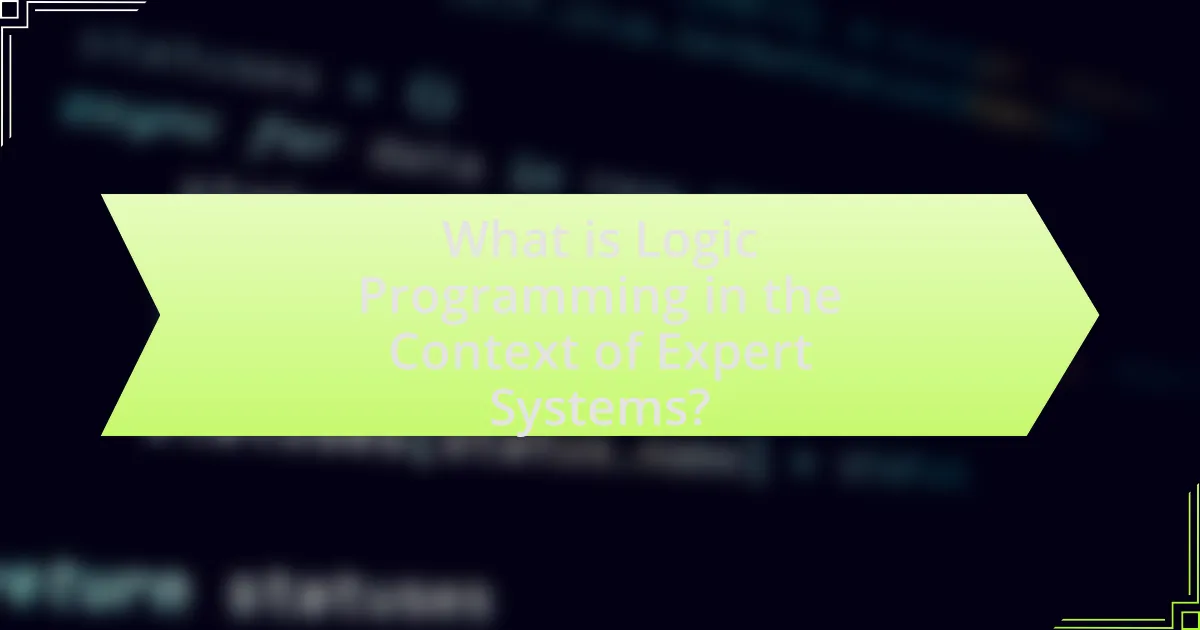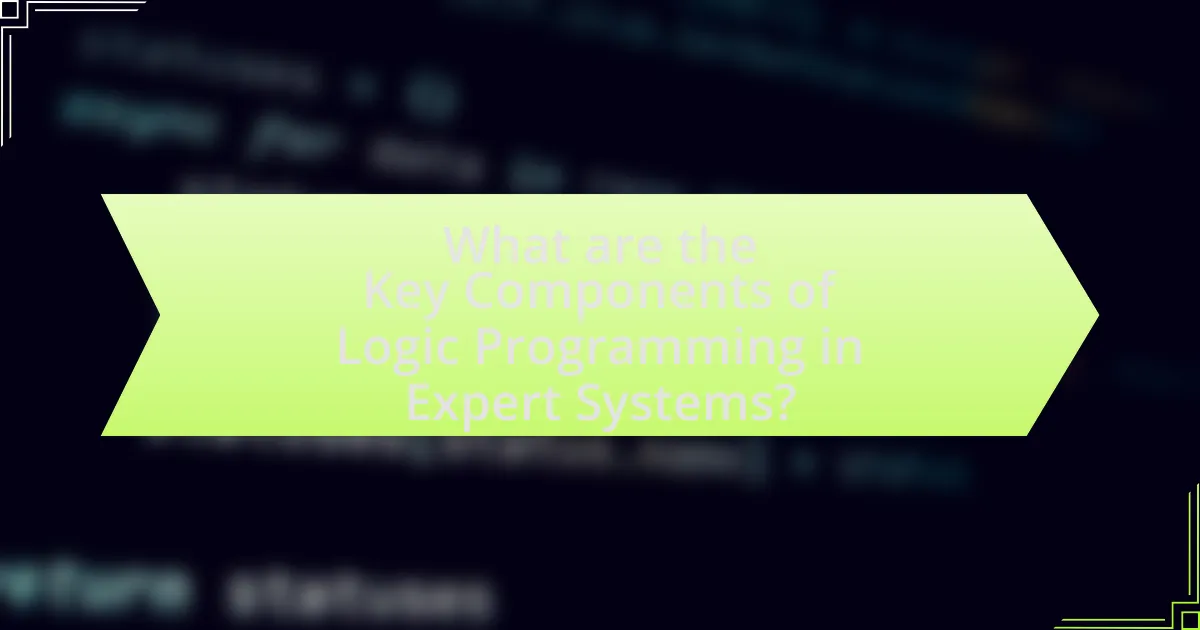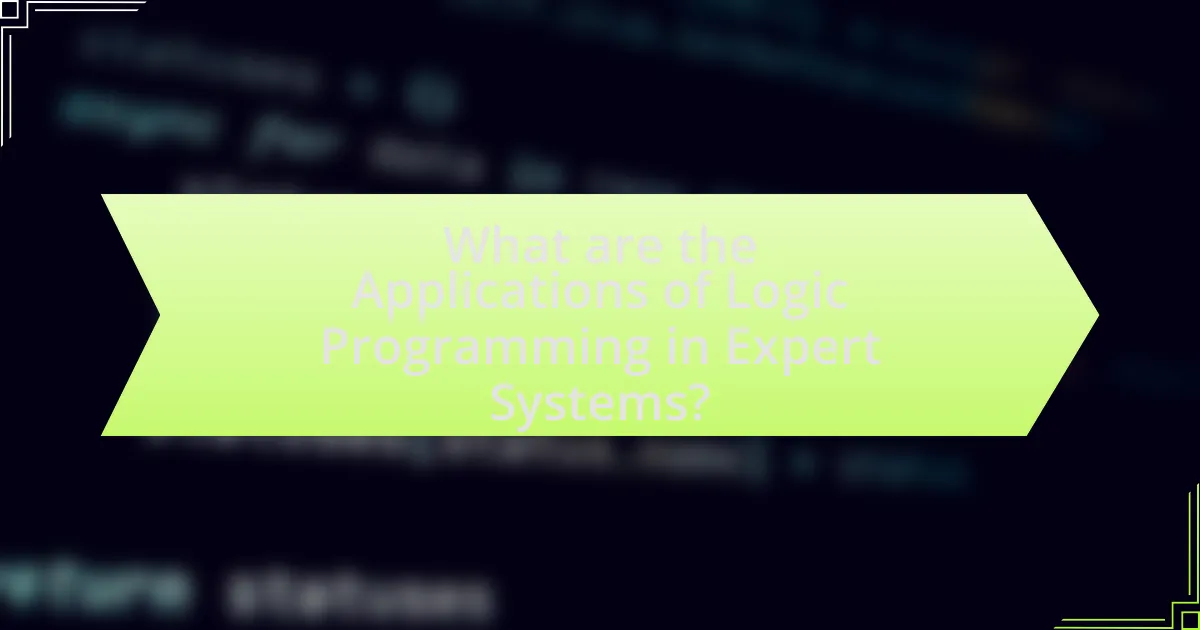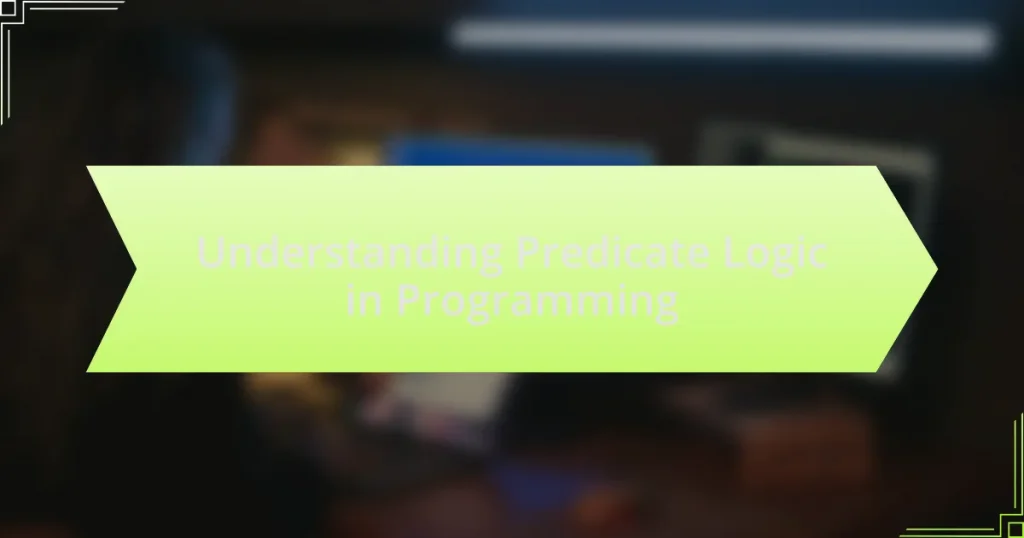Logic programming is a programming paradigm essential for the development of expert systems, enabling the formal representation of knowledge through rules and facts. This article explores the principles of logic programming, highlighting its differences from other programming paradigms, such as imperative and object-oriented programming. It discusses the key components of logic programming, including facts, rules, and inference engines, and examines how these elements facilitate problem-solving and reasoning in expert systems across various domains, such as medical diagnosis and financial decision-making. Additionally, the article addresses the challenges and limitations of logic programming, particularly in handling uncertainty and performance issues, while offering best practices for effective implementation in expert systems.

What is Logic Programming in the Context of Expert Systems?
Logic programming is a programming paradigm that is particularly suited for developing expert systems, as it allows for the representation of knowledge in a formal, logical manner. In expert systems, logic programming facilitates the encoding of rules and facts that the system can use to infer conclusions and make decisions. For instance, Prolog, a well-known logic programming language, enables the creation of complex rule-based systems where the relationships between different entities can be expressed through logical statements. This approach is validated by the fact that many expert systems, such as medical diagnosis systems, utilize logic programming to derive conclusions from a set of known facts and rules, demonstrating its effectiveness in reasoning and problem-solving within specific domains.
How does Logic Programming differ from other programming paradigms?
Logic programming differs from other programming paradigms primarily in its use of formal logic to express computations. In logic programming, programs consist of a set of sentences in logical form, expressing facts and rules about a problem domain, which allows for automated reasoning and inference. This contrasts with imperative programming, where the focus is on how to perform tasks through a sequence of commands, and object-oriented programming, which emphasizes data encapsulation and interaction through objects. The declarative nature of logic programming enables programmers to specify what the program should accomplish rather than how to achieve it, facilitating easier problem-solving and knowledge representation, particularly in expert systems.
What are the fundamental principles of Logic Programming?
The fundamental principles of Logic Programming include the use of formal logic as a programming paradigm, the representation of knowledge through facts and rules, and the execution of queries to derive conclusions. Logic Programming is based on the idea that programs can be expressed as a set of logical statements, where the computation is performed by applying inference rules to these statements. This paradigm allows for declarative programming, where the focus is on what the program should accomplish rather than how to accomplish it. The validity of these principles is supported by the success of languages like Prolog, which utilize these concepts to solve complex problems in artificial intelligence and expert systems.
How does Logic Programming facilitate problem-solving in Expert Systems?
Logic programming facilitates problem-solving in expert systems by providing a formal framework for knowledge representation and inference. This paradigm allows expert systems to express complex relationships and rules in a declarative manner, enabling them to derive conclusions from given facts. For instance, Prolog, a prominent logic programming language, uses a set of logical statements to represent knowledge, which can be queried to solve problems efficiently. The ability to perform automated reasoning through backward and forward chaining enhances the system’s capability to handle uncertainty and make decisions based on incomplete information. This structured approach to problem-solving is validated by its widespread application in domains such as medical diagnosis and financial forecasting, where expert systems have successfully utilized logic programming to achieve high accuracy and reliability in decision-making.
Why is Logic Programming important for Expert Systems?
Logic programming is important for expert systems because it provides a formal framework for representing knowledge and reasoning about it. This paradigm allows expert systems to utilize rules and facts to derive conclusions, enabling them to mimic human decision-making processes. For instance, Prolog, a prominent logic programming language, facilitates the creation of complex rule-based systems that can efficiently handle uncertainty and incomplete information. The ability to express knowledge in a declarative manner enhances the maintainability and scalability of expert systems, making them more adaptable to evolving domains.
What advantages does Logic Programming provide in knowledge representation?
Logic programming offers significant advantages in knowledge representation, primarily through its declarative nature, which allows for clear expression of facts and rules. This clarity facilitates easier understanding and manipulation of complex knowledge structures. Additionally, logic programming supports automated reasoning, enabling systems to derive conclusions from given facts and rules efficiently. For instance, Prolog, a well-known logic programming language, allows for the representation of relationships and constraints, making it suitable for applications in artificial intelligence and expert systems. The ability to handle uncertainty and incomplete information further enhances its utility in real-world scenarios, as seen in various expert systems that rely on logic programming for decision-making processes.
How does Logic Programming enhance reasoning capabilities in Expert Systems?
Logic programming enhances reasoning capabilities in expert systems by providing a formal framework for knowledge representation and inference. This framework allows expert systems to derive conclusions from a set of rules and facts using logical deduction. For instance, Prolog, a prominent logic programming language, enables the encoding of complex relationships and rules, facilitating automated reasoning processes. The ability to express knowledge in a declarative manner allows expert systems to efficiently handle uncertainty and incomplete information, thereby improving decision-making accuracy.

What are the Key Components of Logic Programming in Expert Systems?
The key components of logic programming in expert systems include facts, rules, and an inference engine. Facts represent the knowledge base, containing specific information about the domain. Rules define the logical relationships and conditions under which conclusions can be drawn from the facts. The inference engine processes these rules and facts to derive new information or make decisions, utilizing techniques such as forward chaining and backward chaining. This structured approach enables expert systems to simulate human reasoning effectively, as evidenced by their application in fields like medical diagnosis and financial forecasting.
What role do facts and rules play in Logic Programming?
Facts and rules are fundamental components of Logic Programming, serving as the building blocks for knowledge representation and inference. Facts represent specific information or data points that are accepted as true within the system, while rules define the logical relationships and conditions under which facts can be inferred or derived. For example, in a rule-based system, a rule might state that if a certain condition is met (e.g., “If it is raining”), then a conclusion can be drawn (e.g., “Then the ground is wet”). This structure allows Logic Programming to facilitate automated reasoning and decision-making in expert systems, enabling them to derive new knowledge from existing facts and rules. The effectiveness of Logic Programming in expert systems is evidenced by its application in various domains, such as medical diagnosis and legal reasoning, where accurate inference from established facts and rules is crucial for effective problem-solving.
How are facts represented in Logic Programming?
Facts in Logic Programming are represented as atomic propositions or predicates, typically in the form of clauses. Each fact is expressed as a statement that asserts a relationship or property, such as “parent(john, mary),” indicating that John is a parent of Mary. This representation allows for logical inference and reasoning, as the facts can be used in conjunction with rules to derive new information. The use of predicates in a structured format enables the system to process and manipulate knowledge effectively, which is essential for the functioning of expert systems.
What types of rules are commonly used in Expert Systems?
Expert systems commonly utilize production rules, which are conditional statements that dictate actions based on specific conditions. These rules typically follow the “if-then” format, allowing the system to infer conclusions or take actions when certain criteria are met. Additionally, expert systems may employ heuristic rules, which are guidelines derived from experience rather than strict logic, to handle complex problem-solving scenarios. The use of these types of rules enables expert systems to mimic human decision-making processes effectively, providing solutions in various domains such as medical diagnosis and financial forecasting.
How do inference engines utilize Logic Programming?
Inference engines utilize Logic Programming by applying logical rules and facts to derive conclusions from a knowledge base. This process involves using a formal system of rules, such as Prolog, where facts are represented as predicates and rules as implications. The inference engine systematically applies these rules to the known facts to infer new information, enabling automated reasoning and problem-solving. For example, in expert systems, Logic Programming allows the inference engine to handle complex queries and provide solutions based on the logical relationships defined within the knowledge base.
What are the different types of inference mechanisms?
The different types of inference mechanisms include forward chaining, backward chaining, and resolution. Forward chaining is a data-driven approach that starts with known facts and applies rules to infer new facts until a goal is reached. Backward chaining, on the other hand, is a goal-driven approach that starts with a goal and works backward to determine which facts must be true to support that goal. Resolution is a rule of inference used primarily in propositional logic and predicate logic, where contradictions are resolved to derive conclusions. These mechanisms are foundational in logic programming and expert systems, enabling automated reasoning and decision-making processes.
How does backward chaining differ from forward chaining in inference?
Backward chaining and forward chaining are two distinct inference methods used in logic programming. Backward chaining starts with a goal and works backward to find the necessary conditions or facts that support that goal, making it useful for goal-driven reasoning. In contrast, forward chaining begins with available facts and applies inference rules to derive new facts until a goal is reached, making it suitable for data-driven reasoning. This difference highlights how backward chaining is more efficient in scenarios where specific conclusions are sought, while forward chaining is effective in situations where comprehensive data accumulation is needed.

What are the Applications of Logic Programming in Expert Systems?
Logic programming is applied in expert systems primarily for knowledge representation, reasoning, and problem-solving. Expert systems utilize logic programming languages, such as Prolog, to encode domain knowledge in a structured format that allows for efficient querying and inference. This enables the systems to derive conclusions from a set of rules and facts, facilitating decision-making processes in various fields like medical diagnosis, financial forecasting, and troubleshooting technical issues. The effectiveness of logic programming in expert systems is evidenced by its ability to handle complex queries and provide explanations for its reasoning, which enhances user trust and understanding.
In which domains are Expert Systems powered by Logic Programming commonly used?
Expert Systems powered by Logic Programming are commonly used in domains such as medical diagnosis, financial services, and legal reasoning. In medical diagnosis, these systems assist healthcare professionals by analyzing patient data and suggesting possible conditions based on established medical knowledge. In financial services, they help in credit assessment and fraud detection by evaluating patterns and rules derived from historical data. In legal reasoning, Expert Systems support lawyers by providing case analysis and legal advice based on existing laws and precedents. These applications demonstrate the effectiveness of Logic Programming in handling complex decision-making tasks across various fields.
How does Logic Programming contribute to medical diagnosis systems?
Logic programming contributes to medical diagnosis systems by enabling the representation of complex medical knowledge and reasoning processes in a structured format. This approach allows for the creation of rules and facts that can be used to infer diagnoses based on patient symptoms and medical history. For instance, systems like MYCIN, developed in the 1970s, utilized logic programming to diagnose bacterial infections by applying a set of rules derived from expert knowledge, demonstrating the effectiveness of this method in clinical decision-making. The ability to handle uncertainty and provide explanations for diagnoses further enhances the reliability and transparency of medical diagnosis systems, making logic programming a vital component in the development of intelligent healthcare solutions.
What role does Logic Programming play in financial decision-making systems?
Logic Programming plays a crucial role in financial decision-making systems by enabling the representation and manipulation of complex financial rules and relationships. This programming paradigm allows for the creation of systems that can reason about financial data, automate decision processes, and derive conclusions based on logical inference. For instance, systems utilizing Logic Programming can efficiently handle constraints and dependencies in financial models, leading to more accurate risk assessments and investment strategies. The ability to express financial knowledge in a formalized manner enhances the transparency and reliability of decisions made within these systems, as evidenced by applications in algorithmic trading and credit scoring, where logical rules govern the decision-making process.
What challenges are associated with using Logic Programming in Expert Systems?
The primary challenges associated with using Logic Programming in Expert Systems include difficulty in handling uncertainty, performance issues, and complexity in knowledge representation. Logic Programming relies on formal rules and facts, which makes it less effective in scenarios where uncertainty or incomplete information is prevalent, as seen in real-world applications. Performance can degrade significantly with large knowledge bases due to the computational overhead of reasoning processes, particularly in systems that require real-time responses. Additionally, representing complex knowledge and relationships can lead to intricate and less maintainable code, complicating the development and updating of Expert Systems. These challenges highlight the limitations of Logic Programming in practical implementations of Expert Systems.
What limitations does Logic Programming have in handling uncertainty?
Logic programming has significant limitations in handling uncertainty due to its reliance on binary truth values, which restricts its ability to represent and reason about uncertain or probabilistic information. Traditional logic programming frameworks, such as Prolog, operate under the assumption that facts are either true or false, making it challenging to incorporate degrees of belief or uncertainty. This limitation is evident in scenarios where incomplete or ambiguous information is present, as logic programming lacks mechanisms for probabilistic reasoning or handling contradictory information effectively. Consequently, expert systems that utilize logic programming may struggle to make informed decisions in uncertain environments, leading to potential inaccuracies in conclusions drawn from incomplete data.
How can performance issues arise in Logic Programming-based Expert Systems?
Performance issues in Logic Programming-based Expert Systems can arise due to inefficient search algorithms and unoptimized rule sets. These systems often rely on backtracking and depth-first search methods, which can lead to excessive computation time when exploring large search spaces. Additionally, if the rule sets are not well-structured or contain redundant rules, the inference engine may struggle to derive conclusions efficiently, resulting in slower response times. For instance, a study by Kowalski in 1979 highlighted that the complexity of logic programming can lead to exponential time complexity in certain scenarios, further exacerbating performance issues.
What best practices should be followed when implementing Logic Programming in Expert Systems?
When implementing Logic Programming in Expert Systems, best practices include ensuring clarity in knowledge representation, utilizing modular design, and maintaining efficient inference mechanisms. Clarity in knowledge representation allows for easier understanding and debugging of the system, which is crucial for effective problem-solving. Modular design promotes reusability and simplifies updates, as components can be modified independently without affecting the entire system. Efficient inference mechanisms, such as forward and backward chaining, enhance the system’s performance by optimizing how conclusions are drawn from the knowledge base. These practices are supported by the success of various expert systems, such as MYCIN, which effectively utilized these principles to diagnose medical conditions.
How can developers ensure efficient knowledge representation?
Developers can ensure efficient knowledge representation by utilizing structured frameworks such as ontologies and knowledge graphs. These frameworks facilitate the organization of information in a way that enhances retrieval and reasoning capabilities. For instance, ontologies define a set of concepts and categories in a subject area, along with the relationships between them, which allows for more precise querying and inference. Research indicates that using ontologies can improve the interoperability of systems, as demonstrated in the study “Ontology-Based Data Access: A Survey” by Alani et al., which highlights the effectiveness of ontologies in managing complex data relationships.
What strategies can be employed to optimize inference processes?
To optimize inference processes in expert systems, strategies such as employing efficient algorithms, utilizing heuristics, and implementing parallel processing can be utilized. Efficient algorithms, like those based on resolution or tableaux methods, reduce computational complexity, thereby speeding up inference. Heuristics can guide the search process, allowing the system to prioritize more promising paths and avoid unnecessary computations. Parallel processing leverages multiple processors to handle different parts of the inference simultaneously, significantly enhancing performance. These strategies collectively improve the speed and efficiency of inference in logic programming within expert systems.



